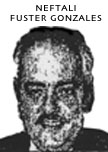|
Para ver este documento en
español, oprima aquí.
VIEWPOINT
THE SAN JUAN STAR
P.R. Republican Party Celebrates 100 Years
by Neftali Fuster Gonzalez
July 4, 1999
Copyright © 1999 THE SAN JUAN STAR. All Rights Reserved.
 The first Independence
Day celebration in Puerto Rico was held on July 4, 1899. On that
same day, another historical event took place: the founding of
the Puerto Rican Republican Party. The first Independence
Day celebration in Puerto Rico was held on July 4, 1899. On that
same day, another historical event took place: the founding of
the Puerto Rican Republican Party.
Throughout this century, the Republican Party has been more
than a mere political organization. In the Republican Party we
find an ideological movement, the embodiment of an honorable political
tradition and the custodian of the ideal of statehood for Puerto
Rico.
On July 4, 1899, statehood for the island seemed to be an unreachable
star, an impossible dream. But after a century of struggle, even
in the face of many electoral defeats, there is now a real possibility
for Puerto Rico to become, in the foreseeable future, the 51st
State of the Union.
Several generations of Republicans, following the example of
party founder, José Celso Barbosa, have persevered in the
struggle for their ideal. And their perseverance has turned a
dream into a real possibility.
The Republican Party deserves, indeed, its just place in the
pages of Puerto Rico's political history.
The roots of the Puerto Rican Republican Party are to be found
both in the autonomist movement of the 19th century as well as
in the separatists who formed the Puerto Rico Section of the Cuban
Revolutionary Party.
Barbosa was a disciple of Román Baldorioty de Castro,
a supporter of a republican form of government for Spain. The
autonomist ideal of Baldorioty was based on two fundamental principles:
local self-government and Puerto Rican representation in the Spanish
parliament on equal terms with the other provinces of Spain.
In 1897 an assembly was held in San Juan to determine if the
autonomist movement were to enter into a pact with a monarchical
party in Madrid. Barbosa, as a loyal keeper of the political principles
of Baldorioty, rejected the proposed pact. The majority of the
delegates at the assembly sided with Luis Muñoz Rivera
and the pact was ratified. The supporters of Muñoz formed
the monarchical Liberal Fusionist Party, while the followers of
Barbosa founded the "Partido Autonomista Ortodoxo".
In those days, the political activism of Puerto Ricans was
not limited to San Juan or Madrid. In New York, a group of separatists,
led by Dr. José Julio Henna and Roberto H. Todd, had formed
the Puerto Rico Section of the Cuban Revolutionary Party. Before
the outbreak of the Spanish-American War, those separatists offered
their support to the American armed forces, hoping that in the
upcoming conflict, as it happened, the island was to be invaded
and the harsh Spanish rule was to be put to an end.
The fateful year of 1898 brought the war, and after it, American
sovereignty in Puerto Rico. Thus began a period of adaptation
to the new realities. The political groups directed by Barbosa
and Muñoz Rivera began to get reorganized.
The followers of Barbosa issued a manifesto declaring that
statehood was in agreement with the liberal tradition of the Puerto
Rican people. On March 25, 1899, a platform was approved, in which
it was stated that "it is the highest duty of every citizen
to uphold the laws of the land and the integrity of his country."
The platform also supported the organization of a territorial
government "as the way to become in time a State of the Federal
Union."
A convention was held in San Juan July 2-4, 1899, wherein the
Puerto Rican Republican Party was founded. Most of its members
were followers of Baldorioty and had supported the ideas of Francisco
Pi y Margall for a federal republic in Spain. among them was Francisco
Mariano Quiñones, Federico Degetau and Manuel F. Rossy.
Former separatists Roberto H. Todd and Mateo Fajardo were also
among the founders.
The Republican Party that was born 100 years ago is still alive
in the struggle of attaining full equality for the American citizens
of Puerto Rico.
It has been, indeed, a great political and ideological institution,
which can be described by certain words from French historian
Alexis de Tocqueville: "The political parties that I would
call great are those which cling more to principles than to consequences;
to general, and not to special cases; to ideas, and not to men.
Such parties are usually distinguished by a nobler character,
more generous passions, more genuine convictions, and a more bold
and open conduct than others."
| 
